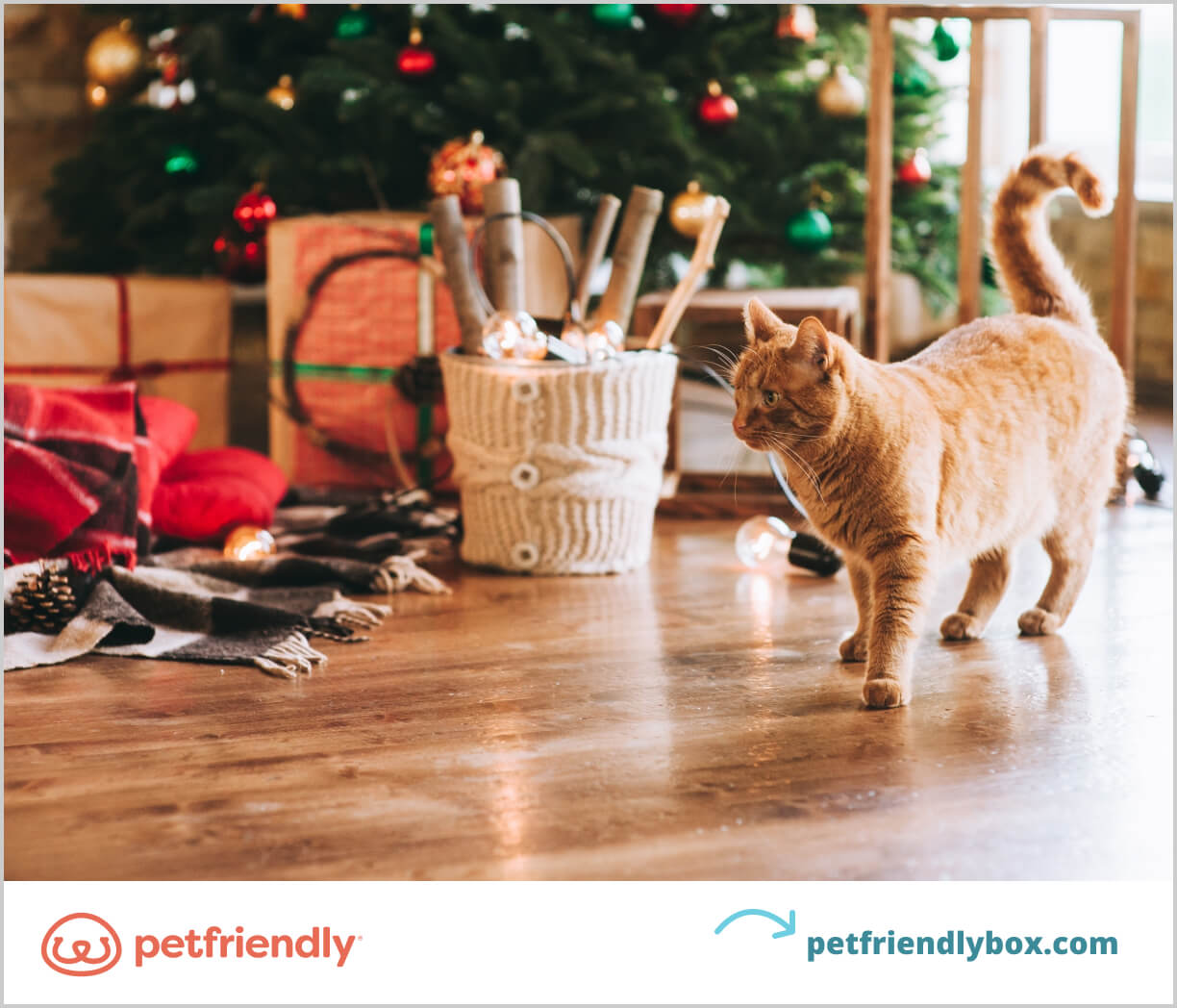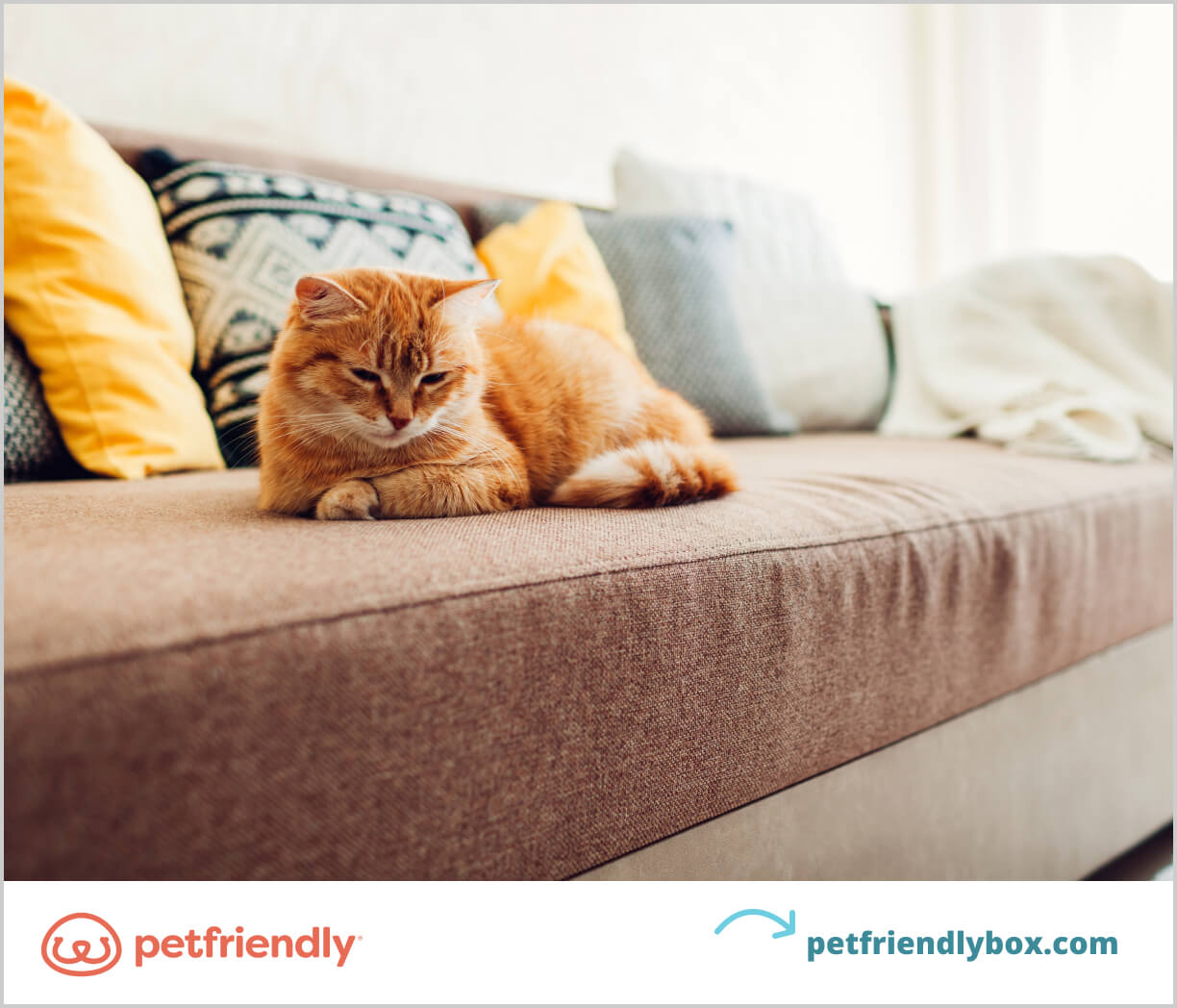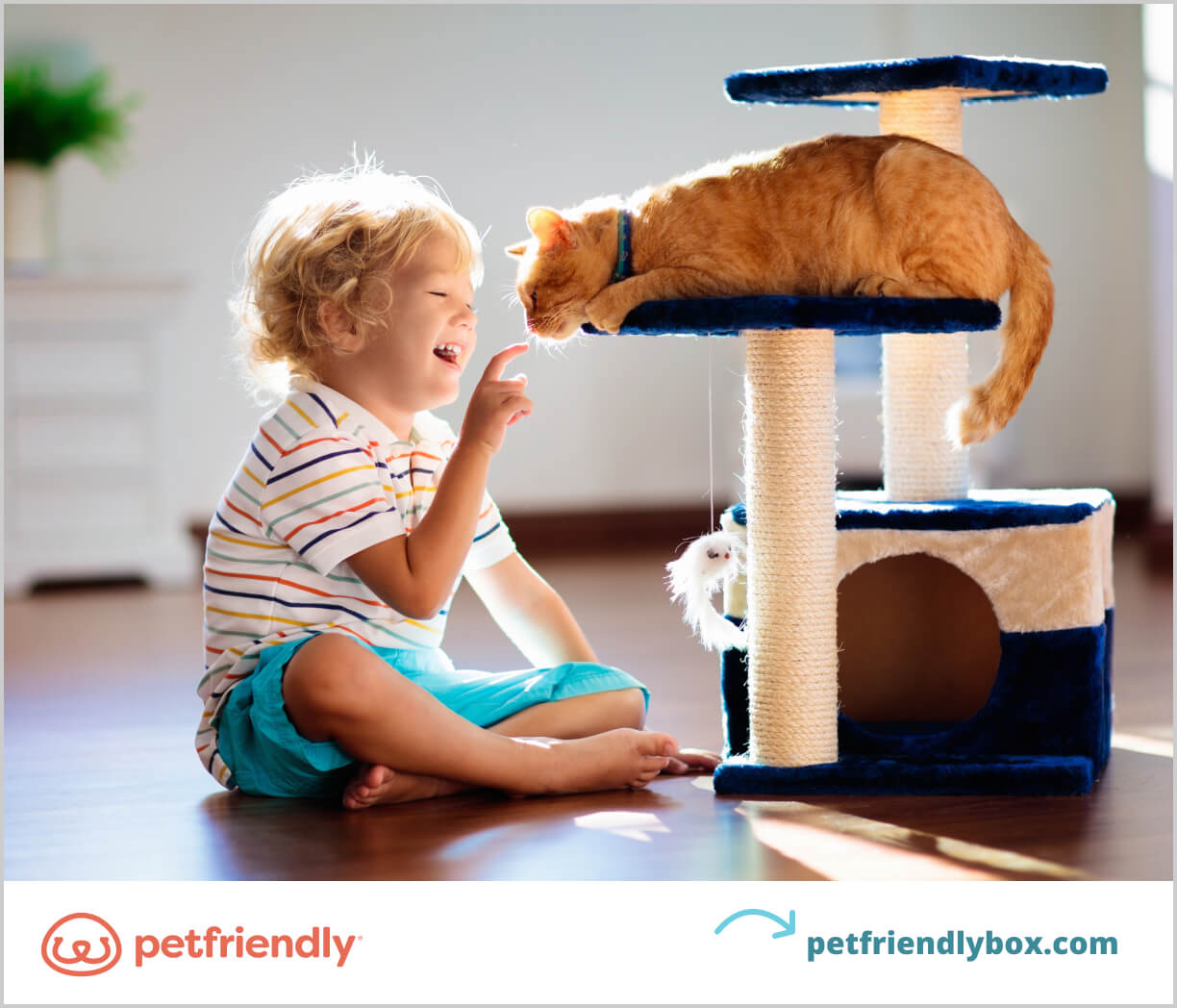The holiday season is a great time to get together with friends and family and enjoy the festivities. And it's only human to want to include our pets in the holiday celebration.
This could mean cuddling up with your cat at home watching a movie or hosting a holiday get-together. Either way, it's important to make sure your cat is happy, healthy, and safe. Unfortunately, many holiday decorations can be hazardous to your cat's health.
Food, furniture, and other household items can also pose a risk to cats during the holidays. But, you may not know how to cat-proof your house. Especially if you're bringing a new pet home this year.
As you prepare for the season, make sure you have plenty of pet-friendly holiday ideas that cover every part of your home. This will help you identify any hazards that could hurt your feline friends. You may need to remove or put away certain hazards to keep your cat safe. And keep emergency vet bills at bay.
In this article, we'll share a few tips on how to cat-proof your house. Here are 6 areas to consider when cat-proofing your home to reduce risk and keep everyone safe:
- Chemicals
- Plants
- Food
- Electrical
- Furniture
- Household items

Chemicals

Hosting a party in your home takes a lot of preparation. From cleaning and tidying your space to filling it with the scents of the holidays, there are lots of chemicals around. Many of which can be potentially dangerous to your cat.
Cleaning supplies
A welcoming home is a clean one. And achieving spotless surfaces and floors often requires cleaning supplies with dangerous chemicals. But you don't need cleaners filled with dangerous toxins to do the trick and maintain your dog or cat's health.
Consider using all-natural cleaning supplies like Mrs. Meyer's or Seventh Generation that are animal and pet-friendly. These contain ingredients that not only keep your house clean but smell fresh.
No matter what you use, it's best to apply cleaners throughout your house while your cat is placed in another room. Once finished, put cleaners and cleaning supplies away in locked or secure closets where your pet cannot access them.
Scents
There are many familiar scents associated with the holiday season. And they come in a variety of forms. The most popular scents that are toxic to cats include cinnamon, pine, wintergreen, and clove.
Many use wax warmers, oil diffusers, and room sprays to make their homes smell like the holidays all winter long. Unfortunately, these products present several dangers when it comes to curious cats.
Here are a few ways to cat-proof your home without sacrificing your favorite holiday smells.
Essential oils and diffusers
Essential oils are derived from plants, but that doesn't mean they're completely safe for cats. Even natural ingredients can cause problems for cats and pets. Some symptoms include trouble breathing, skin burns, vomiting, and tremors.
Room sprays
Room sprays can't burn your cat, but they're not much safer than wax warmers or essential oils. Aerosols and air fresheners have ingredients that can trigger asthma attacks in cats.
Even if your kittens don't have asthma, room sprays can trigger coughing fits and other lung symptoms. These include:
- Irritation of ear, nose, and throat
- Headaches
- Dizziness
- Lethargy
- Nausea
- Liver or kidney damage
- Cancer
Wax warmers and candles
Besides being a potential fire hazard in your home, waxes, and candles can create several health problems for your cat. Depending on which scent you use, scented wax can cause coughing, sneezing, and shortness of breath.
The risk is especially high if you use wax melts made of paraffin, which is made from petroleum. When you burn a paraffin wax melt, it gives off soot that can irritate the feline respiratory tract.
Alternative Holiday Scent Tips
If you just can't live without your favorite holiday scents, try these cat-proofing tips to keep your cat safe.
1. Bake fresh holiday goodies.
Instead of using a room spray, try baking your favorite cookies, cupcakes, or pies. These homemade goodies smell great and you won't have to worry about your cat inhaling toxic chemicals. And as an added bonus, you'll have fresh baked goods to share with friends.
2. Use natural sources of scents.
Another way to keep your feline friend safe is to look for natural sources of your favorite holiday scents. For example, if you love peppermint, try hanging candy canes in your house instead of diffusing peppermint oil throughout your home. Just make sure they are out of reach from your cat.
3. Create a terrarium.
Pinecones in a bowl on your night table are a good alternative to pine oil. But, you'll need to make sure you use them in a room with a door that you can close.
Instead, fill a jar with pinecones, dried citrus, whole cloves, and balsam boughs. Cover with saran wrap and a few rubber bands and poke holes in the top to diffuse the scent.
4. Make a stovetop potpourri.
You already spend a lot of time in the kitchen during the holidays, so why not make it smell great? Bring a large pot of filtered water to a boil.
Add sprigs of rosemary, lemon or orange peels, and cinnamon sticks to your pot. Simmer for a few hours and add more water as needed.
5. Crack a few windows.
Sometimes the best scent is fresh air. If you live in a climate where it's possible to open windows and doors, let that cool breeze in.
Make sure to tie back blind strings and keep screens secure. That way your cat stays inside and doesn't get tangled up in the loose strings.
Plants

It's common for people to decorate their homes with plants during the holiday season. But, many of these are actually poisonous plants and are toxic to cats.
The good news is that you can still enjoy a little greenery without putting your cat's health at risk. Here are a few plants to watch out for along with tips to cat-proof your holiday foliage.
Christmas trees
The focal point of your holiday is often the Christmas tree, especially in the United States. But those twinkling lights and sparkling ornaments look like fun toys for your cats. And let's face it, cats love to climb and play with shiny objects dangling in front of them.
If your cat decides to take a climbing adventure your tree could come crashing down. Especially if it is top-heavy or unsteady, use a sturdy stand. Or, anchor your tree to the ceiling or wall to keep it from tipping over.
Christmas trees generally aren't toxic to cats. But, they have sharp needles that can harm them if they try to play with the tree. The tips of the needles can cut a cat's mouth and increase the risk of infection.
If you have a fake tree...
If your cat loves to nibble on things, consider switching to an artificial tree. But, do a thorough inspection before putting it up.
Broken needles and small pieces of plastic can be harmful if swallowed. Place a tree skirt at the bottom to collect any stray needles.
If you have a real tree...
If you just can't live without a fresh tree, be sure to keep it watered. A dry tree is much more likely to fall over than one that's properly hydrated.
To keep your cat away from it, wrap the trunk in foil. You can also put citrus peels around the base of the tree. Cats generally don't like the smell of oranges and lemons. So, putting citrus peels near the tree can discourage a curious cat from getting too close.
Plus, the crinkly foil may startle the cat enough to keep it away from the tree and out of danger. This is why foil is a popular tool for cat-proofing Christmas tree trunks and branches in your household.
In addition to being dangerous, cats love knocking things off of high places. This means you'll spend half your time chasing your cat around the house and cleaning up shards of glass.
Ornaments are not toys. It can be tempting to let your cat play with pretty glass ornaments on the tree but resist the urge. Stick to pet-safe ornaments like stuffed animals, ribbons, or felt shapes.
Holly and mistletoe
Holly and mistletoe are extremely common decorations used around the holidays. And the sheer placement of mistletoe makes it an enticing game for your cat. Try out these tips when decorating with these popular (sometimes poisonous) objects this season.
Holly
Holly contains saponins that can lead to vomiting and diarrhea in your cat. If you love Holly and don't want to put your cat at risk, you have some options.
Instead of keeping it indoors, purchase a holly wreath and hang it on your front door. You'll be able to enjoy the colorful plant without worrying about your cat's health. Note: This works best if you have an indoor cat or kitten.
Another option is to purchase a garland made from holly and hang it around the ceiling of your favorite room. As long as the ceiling is high enough, your cat shouldn't be able to access the garland.
Mistletoe
Mistletoe contains phoratoxins and lectins, compounds that can cause stomach problems, slow your cat's heart rate, and lower blood pressure.
If you still want to add a little romance to the holiday season, hang mistletoe where your cat can't reach it. For example, if your house has an archway between two rooms, consider hanging the mistletoe in the archway.
Poinsettias and flowers
Poinsettia and other holiday plants add a pop of color to tablescapes. They are also easy to include in your existing decorating scheme. But, there are a few poisonous plants you'll want to avoid if you have a cat or dog.
Poinsettia
Poinsettia is one of the most common poisonous plants used during the holidays. The SPCA says that the toxicity of the plant is a little "overrated." But, it's worth noting that it has a toxic sap that can irritate your cat's stomach. So, it's best to be cautious about keeping this plant in your house during the holiday season.
One way to ensure your cat doesn't play with your poinsettia is by putting it on a high mantle. If the plant is high enough, your cat may not be able to reach it. Then, move coffee tables, chairs, and other furniture out of the way. That way they can't use them to get up on the mantle to explore.
This approach works best when you're at home. If you have to go somewhere, put the poinsettia in another room with the door closed. Or you can place it outside, weather permitting. This will protect your cat from getting into trouble while you're gone.
Flowers
Other poisonous plants are often found in bouquets of flowers around your house. Common flowers used to decorate during the holidays that are toxic to cats include amaryllis, chrysanthemums, and lilies.
In fact, every aspect of lilies, from the stem to the water in the vase, can be threatening to your cat. Even if they consume small traces of lilies they can develop kidney failure in a matter of days.
The reality is, many plants look like food to cats. Especially if they spend time outdoors rummaging through grass and trees. Even though lilies and other plants are natural, these "food" items aren't going to bode well for your cat or dog.
A good replacement for most plants and flowers is to use fake ones instead. But if you're wanting a fresh floral arrangement in your home during the holidays, consider colorful Gerber daisies, sunflowers, or roses.

Food

A key part of nearly every holiday is gathering around the table with friends and family. Usually, with delicious food and drink. But not everything that a human eats is safe for your animal to eat.
One great way to cat-proof your house is by knowing the types of food they can and cannot have. Beyond that, make sure your guests know they shouldn't feed your pet any food from the table. No matter how much your cat or dog begs.
Alcoholic beverages
Less of a food item and more of a beverage, alcohol is another dangerous substance for your cat. It's harmful to cats and commonly found in your home during the holidays. Alcohol can lead to vomiting, diarrhea, lethargy, and trouble breathing.
Because cats are so small compared to humans, even a few sips of wine, beer, or spirits can be dangerous. It's normal to want to enjoy some wine or open a bottle of bubbly during a holiday celebration. But, keep your cat away from the glasses.
You may need to put your cat or dog in another room and close the door. At least until you can clean up in case your cat tries to tip over a glass or two. After all, dogs and cats love to lick up any leftover food remains.
Chocolate
It's commonly known that chocolates are toxic to both your cat and dog. Chocolate contains theobromine, a substance that can cause severe illness in cats, dogs, and other pets. If you receive a box of chocolates as a holiday gift, keep it well out of your cat's reach.
Place sweet treats in a cabinet or drawer that your pet cannot access. You can also sometimes put them in the refrigerator to keep them from melting in your warm kitchen.
Also, watch out for baked goods and sauces that could sneakily contain cinnamon or chocolate. It's easy to hide these ingredients in recipes without them being obvious to the human eye.
A good practice is to avoid giving your cat anything but their own food or cat treats during the holidays. But if you want to share your human food, you can give your cat a few food items (in moderation):
- Plain sweet potatoes
- Unseasoned chicken or salmon
- Canned pumpkin
- Steamed green beans (no sauce)
Fruitcake
A classic holiday food is a fruitcake. This half-dessert, half-bread is made of an assortment of dried fruits from apricots to raisins. Unfortunately, these contain compounds that can cause vomiting, diarrhea, and other symptoms in your cat. To prevent illness, never give your pet fruitcake or another food item with dried fruits in them.
If you have children, keep an eye on them while they're eating. Out of curiosity, they could share their food with your new pet. Watch carefully so that you can pick up pieces of food from the floor.
Keep all food and drinks in sealed containers. This will prevent your pet from getting into things they shouldn't and making a mess. Bonus — it'll also help keep your food fresher for longer.
Electrical

Toxic substances aren't the only hazard to know about when learning how to cat-proof your house for the holidays. One of the most beloved decorations is strings of lights inside and outside of your house.
But with every string of lights comes a need for electrical cords and outlets. All of which can be extremely dangerous to your cat or dog.
Electrical cords and outlets
Electrical cords and electrical outlets all pose a risk to cats. Here's what you need to know to keep your cat safe.
Electrical cords
Some cats love to nibble on electrical cords. This increases the risk of house fires and puts your cat in danger of electrocution. There are a few ways you can deter kittens and cats from electrical cords in your home.
1. Rub cords with soap.
To stop a behavior before it starts, create a deterrent. Rub each cord with soap, hot sauce, or another substance that has a strong taste and scent. If your cat gets a whiff, it may stay away from the cord.
2. Use cord protectors.
These help you protect your cords from getting chewed on by any animal — cat, dog, or mouse. A sturdy cover prevents cats from nibbling on cords. It also makes your house look a little more organized.
3. Apply double-sided tape.
If you don't want to invest in cord covers that you'll only use for a few weeks try a cheaper option. Wrap the cords with double-sided tape. Cats generally don't like sticky surfaces. So, the double-sided tape can deter your cat from chewing on cords or tearing at them with their claws.
Electrical outlets
Like children, kittens are curious and like to play with things they should not. Cats love to explore and get their fill scratching on items throughout your home. If your kitten sticks their claw in an electrical outlet, they may be at risk of injury.
One of the best ways to cat-proof your home is by covering electrical outlets with plastic covers. You can purchase them at any hardware store or general merchandise store. These covers are inexpensive and work well to prevent cats from injuring themselves on electrical outlets.
Refrigerators
When you're done baking and cooking, you'll need to store the leftovers. And during the holiday season, you may open the fridge much more than usual. This can increase the risk that your kitty will slip inside.
To keep your pet safe, pay close attention when you're putting away leftovers or getting out ingredients for cooking and baking. Check the fridge to make sure that your cat hasn't climbed in without your knowledge. Consider a fridge lock that makes it harder for your cat or kitten to open it on their own.
Stoves and ovens
For many people, the kitchen is central to holiday festivities. Baking cookies, assembling gingerbread houses, and cooking delicious food are all popular holiday activities. But, all that cooking and baking can be dangerous for cats who like to explore stove burners and ovens for food.
If you don't want to shut your cat in the bedroom while you use these appliances, try these cat-proofing tips:
1. Place aluminum foil on the tops.
Noisy foil deters many cats from climbing, keeping them away from hot burners and open gas flames.
2. Block off the counters.
This way your cat has nowhere to land if it tries to jump. Plus, it'll prevent them from knocking things over.
3. Invest in stove burner covers.
Stove burners are one of the most common hazards in kitchens. So, it's important to make sure they're properly covered when not in use. This will protect your cat from getting burned.
There may be some areas of your kitchen that you just don't want your kitty cat to hide. Such as under the sink or inside the pantry.
To keep kittens out, you can block off these areas with baby gates or pet fences. Just make sure whatever you use is sturdy enough that your pet can't push it over or squeeze under it.

Furniture

If you host family celebrations at your house, you may have to add seating to accommodate everyone. This can include folding tables, chairs, and other pieces of furniture. These extra pieces create additional chances for cat-proofing. After all, your cat is likely to be curious about each new item.
If you add a nice piece of furniture to your house you may also worry about damage. Especially when caused by a curious cat's claws. To cat-proof your furniture and keep your kittens from scratching up your valuables, try these tips:
1. Place aluminum foil on surfaces.
This is a good solution for just about any surface you want to discourage your cat from scratching and climbing. The loud noise and slippery material will deter their curiosity and prevent them from jumping on counters in the future.
2. Apply double-sided tape.
Place the tape on the sides of chairs, couches, and tables to prevent scratching. Clear tape is difficult to see but hard for your kitty cat to scratch.
3. Put plastic carpeting around the area.
Cats love to scratch and plastic carpeting has little spikes in it. When placed in certain areas it can deter your cat from getting into trouble.
4. Gift your cat a scratching post.
As a last resort, put a scratching post nearby. This is a cat-proof way to discourage them from scratching your furniture. Place the scratching post near areas where they like to scratch. Provide incentives such as catnip or treats to encourage them to use the post instead of your furniture.
In addition to protecting your belongings, cat-proof your home overall by removing places your cat can hide. Cats love to hide in small spaces so make sure of any openings in cabinets and under the sink. You can do this with child-proof locks or by using tape or silicone caulk.
Household objects

When you have a new kitten, even the most innocent of objects can turn into a hazard quickly. Cat-proofing your home means picking up after yourself and making sure everything is put away.
Always check your floors, furniture, and countertops for these household items and secure them safely away from your dog or cat.
Toiletries
Like toilet and surface cleaners, toiletries and other bathroom supplies can also be harmful to your pet. Things like anxiety medication, dental floss, and contact lenses are small, easy to swallow, and toxic to your cat. If consumed, they can lead to a veterinary visit in a hurry.
Make it a habit to put away makeup, medication, and dental care items in a drawer or cabinet after use. Pick up articles of clothing and towels around your home and place them in a hamper or laundry basket.
Always check that containers are closed and the lid cover is secure. And, make sure toilet seats are put down.
Toys
Many toys contain small parts that can be dangerous to cats, including batteries and magnets. If a cat swallows two or more magnets, the magnets can stick together in the digestive tract, causing serious complications.
Licking the paint from toys can also lead to an upset stomach. To protect a new pet, keep toys with small parts put away or at least well out of reach.
If you don't have a separate play area, supervise your children while they're playing with these toys. This will help you ensure your cat doesn't ingest anything. When the toys aren't in use, put them on a high shelf. Or, hide them in a closet with a closed door.
Trash
Cats and dogs are curious creatures. Both pets like to sniff, scratch, and dig through your belongings. Cats are notorious for getting into things they shouldn't and your garbage cans are no exception.
Certain items can be dangerous to your cat's life if swallowed. These include:
- Old medication
- Fishing line
- Dental floss
- Rubber bands
- Office supplies
- Household cleaners
When cleaning up your bathrooms and kitchens, be sure to dump your trash cans regularly. String, dental floss, and rubber bands can cause their intestines to bunch up and require emergency surgery.
During the holidays, keep all trash cans stored away in cabinets or cupboards. Also, consider getting one with a tight-fitting, cat-proof lid.
Bonus: 8 tips for cat-proofing your home

Knowing how to cat-proof your house is necessary no matter what time of year. Besides auditing your home, a great way to make sure your pet stays safe is by keeping them healthy and happy.
Follow these simple tips to reduce stress and create a safe environment for you and your feline friend this holiday season.
1. Make sure their kitty litter box is clean.
Just like a human toilet, your cat's litter box is often an oasis from a busy household. Make sure their litter box is clean so they can find an escape if needed.
2. Secure blind cords and windows.
Windows tend to be a place of refuge for cats and dogs. And curiosity often gets the best of your feline friends with new guests, furniture, and food arriving. Be sure to close windows and tie up blind cords to keep them safe.
3. Close and lock exterior doors.
Cats love to bolt when they are uncomfortable. To prevent a runaway kitten issue, make sure all doors are closed or locked as guests come and go.
4. Pick up frequently.
Articles of clothing, plastic toys, and free-standing medication can all become hazards for your pets. Make a habit of picking up items lingering around your home. This includes cat and dog toys that aren't being played with.
5. Put away breakable items.
Cats love exploring, which means that every nook and cranny in your house is fair game. To avoid having priceless heirlooms smashed from the curiosity of a cat, put away any breakable items before guests arrive.
6. Keep them entertained.
A bored cat is a destructive cat. To keep your feline friend from getting into mischief, make sure they have plenty of distractions.
This can include toys and puzzles around the house for them to play with. You might even want to set up a little kitty play area in one room. with a scratching post so they have a safe space to roam free without getting underfoot.
7. Schedule a veterinary visit.
Your kitty should get a cat check-up every year to ensure they are living their best life. Your vet will help you ensure your cat's vaccinations and medications are up to date. This is especially important if you have an older cat.
8. Apply a monthly flea treatment.
When it comes to feline health and wellness, year-round flea & tick prevention is key. It's the best way to keep your cat flea-free and healthy their whole life.
Knowing how to cat-proof your house for the holidays is all about minimizing risk. The holidays are a wonderful time of year, but they can also be stressful — especially if you have cats. By cat-proofing ahead of time, you can make the holidays more enjoyable for everyone. 

